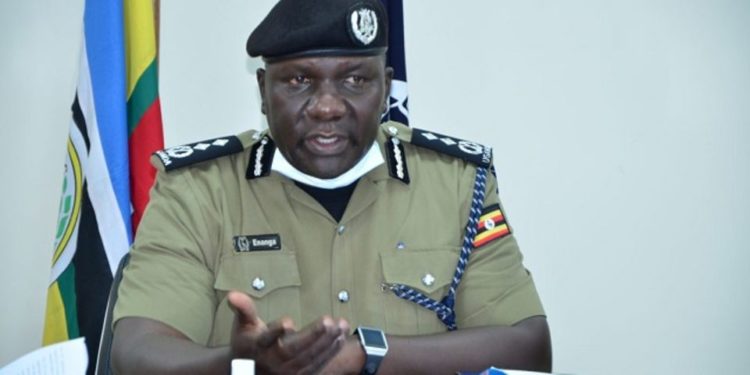The Police Health Services has crafted a comprehensive emergency preparedness plan for police stations across the country as the Ebola death toll rises.
The Ministry of Health says since the outbreak of the Ebola Sudan strain disease in Mubende last week, 21 deaths have been registered with 4 confirmed and 17 probable.
Addressing journalists at the police headquarters in Naguru, police spokesperson Fred Enanga said that they are mostly focusing on capacity building on health for police officers in the Wamala policing region and Rwenzori West region.
All territorial commanders have been tasked to look out for symptoms of high-grade fever, blood-stained vomitus, and diarrhea, loss of appetite, and pain while swallowing. At a later stage, the infected person starts oozing blood in every part of the body.
In the meantime, all police stations and officers have been issued with relevant guidelines to help protect themselves and reduce the likelihood of contracting Ebola. The Director of Police Health Services has put out a task team to closely monitor, coordinate and effectively respond to any emergency situation.
Among other guidelines, police officers have been urged to practice proper hand hygiene by promptly washing or sanitizing hands after coughing, sneezing, or physically interacting with others.
Other guidelines include;
– Avoid touching your face (eyes, nose and mouth).
– Cover your mouth and nose- with your bent elbow or tissue when you cough or sneeze. And make sure to dispose of the tissue immediately. Wash your hands with soap immediately after sneezing or coughing.
– Avoid close physical contact with others, including shaking hands of hugging.
– Avoid sharing items like clothes, shoes etc which can carry body fluids.
– Maintain at least a 6 ft distance between your self and anyone who is coughing, sneezing or talking, when possible. This measure on social distance must cut across all offices, the police counter or reception, police cells and transportation.
– Promptly disinfect your gear, including your duty belt, after physical contact with any individual.
– Keep disinfectant wipes and hand sanitizers in an easily accessible place while on duty.
– Wear a mask if coming into contact with someone who has the Ebola virus and make sure you properly dispose it off.
– Educate yourself and participate in the training on the proper use of Personal Protective Equipment (PPE) for respiratory protection if available. Ensure only trained personnel wearing PPE have contact with individuals who have or may have Ebola.
– Use of referrals of LC5, elders and other community leaders, for minor cases.
– Seek medical care early if you have a fever, cough or difficulty breathing.
– Consider sanitizing items you frequently touch like phones, laptops and folders/clipboards.
– All patrol cars should be regularly sanitized at the steering wheel, gear shift, dispatch radio module, door handles and edges.
– Consider restricting unnecessary movements to burials, weddings, markets and other congested places. Controlled movements are very crucial.









